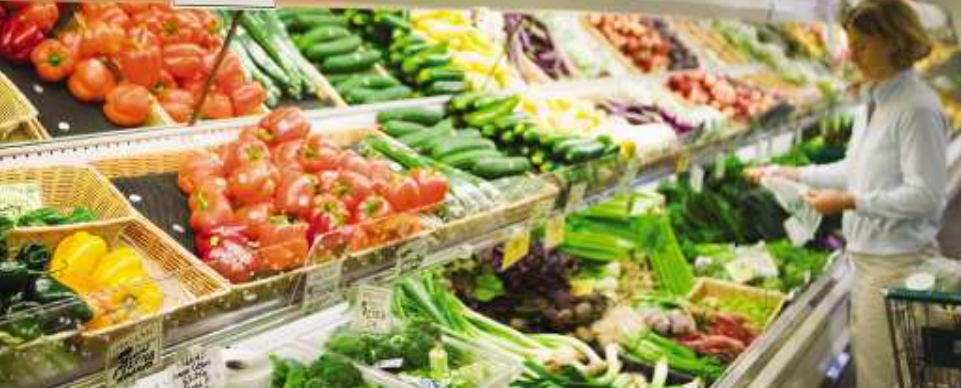|
Shana Spence says she's an "eat-anything" dietitian: She encourages her clients to eat what they actually enjoy. When it comes to food, she says to focus on what nourishes your body, fills you up and doesn't break the bank.
Life Kit consulted Spence for advice on how to cut back costs on food while still eating nutritious meals. Foods labeled "organic" and "non-GMO" are often viewed as the "top shelf" or "name brand" healthy food – and they're priced that way, too. But, there are lots of affordable and wholesome alternatives (hello frozen veggies). Minding your budget while eating the foods that nourish you takes a little planning — but it's possible. Here are some of Spence's tips to help you shop and keep your fridge stocked: Embrace frugality. From personal experience and working with clients, Spence says many people are self-conscious about not being able to afford fancy brands of healthy food. There's no shame in knowing your budget and living within your means. Spence encourages budget-conscious diners to say goodbye to that embarrassment — because healthy eating exists at every price point. "It's fine if you can't afford it or just don't feel the need to shell out big bucks," she says. "It doesn't mean that you're not healthy." Beware buzzwords Buzzwords such as organic, non-genetically modified organism, low sugar and low fat adorn a lot of healthy food products. These descriptions may be useful to some customers, but they're also marketing terms that can paint an inaccurate picture that some foods are substantially healthier than others. "Organic is fine if that's what you want to buy, but for someone who is [budget-conscious], that's not necessary," Spence says. Eating greens is still good for you, for example, whether you buy them organic at a local farmer's market or frozen at a convenience shop around the block. If you shop based on labels alone, it's easier to wind up paying more and not necessarily eating any healthier. Assess products for what's inside them, not by words and phrases that have recently become trendy. Figure out what nutrients you need and look for them in your food. Don't forget coupons If you want to go old school, take a flyer from the front of a store's door and check out its weekly sales. If you're regularly shopping at the same store, become a part of its member program to get further discounts. You can even do your homework ahead of time and come with store and manufacturer coupons you've clipped from a newspaper, magazine or some other resource. If cutting coupons isn't your thing, it might be worthwhile to download the store's app to check for discounts before you head there or at least before you check out. Some apps are easier to use than others, but you can regularly save a couple of dollars each shopping trip if you pay attention to existing discounts. Add, don't subtract. Spence's philosophy of dieting is simple: Diets don't work! She says food should not be an awards system where you either "win" or "lose" the right to eat certain dishes. And you shouldn't have to spend money on a pricey cleanse or meal prep system. This perspective is so counter to diet culture that Spence says her clients are often shocked she doesn't ask them to eliminate their favorite foods, even if it's instant ramen, boxed mac and cheese or pizza. Instead, Spence looks for ways to make favorite foods more fulfilling and nutrient dense. She calls this "bulking up." Including protein or fiber-rich add-ons to your favorite foods can help make these dishes more nourishing and filling. For protein, beans, tofu and chicken are tasty, healthy additions. For fiber, carrots or peppers are easy toppings to a lot of dishes. That way, you don't have to cut something out of your life completely. "It's the best of both worlds," Spence says. Don't snub canned or frozen foods. Depending on where you get your health tips, you may think that vegetables are only good if they come in a bottle of cold-pressed juice. Of course, different variations may matter to people who want to support certain businesses or have different tastes. But vegetables are vegetables, no matter what. Anyone who tries to tell you something different is probably selling something. So, if you're hoping to stock up your pantry or fridge with usable vegetables that you can easily add to your meal, don't overlook fruits and vegetables in the canned or frozen section. "I'm the freezer's biggest cheerleader," Spence says. Canned and frozen vegetables last longer than fresh produce so you don't have to worry about them going bad. "You can just freeze it, and then you will have it for next time." Be sure to check the ingredients list for any unwelcome additives, but they're great if you need a cheap healthy boost in your meal. Plan ahead and make a list. Most dietitians will tell you not to go to the grocery store while you're hungry. But you also shouldn't go without a list. When you shop without a plan, it's really easy to buy more food than you need, or purchase ingredients you already have, leading to waste. Plus, you'll inevitably forget things you do need. Developing a routine to eat healthy and maintain a budget will be easier if you come to the store with an idea of what you're getting and generally how much it will cost. Spence says that "once you start writing things down, especially the foods that you're rebuying constantly...you can kind of see what your tally is going to be at the supermarket." So a list doesn't just help you plan, but it lets you keep track of what you're really eating and how much you're spending.
0 Comments
Leave a Reply. |
Written by
Archives
December 2021
Categories
All
|

 RSS Feed
RSS Feed